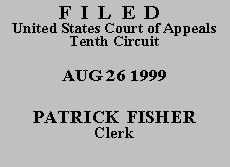

| LINDSEY K. SPRINGER, dba
Bondage Breakers Ministries,
Plaintiff-Appellant, v. THE INFINITY GROUP CO.; ROBERT F. SANVILLE, individually and as Trustee for Infinity Group Co., Defendants-Appellees. |
|
In August 1997, the Securities and Exchange Commission brought a civil enforcement action for securities violations in the United States District Court for the Eastern District of Pennsylvania against The Infinity Group Company (TIGC), Geoffrey Benson and Geoffrey O'Connor, and named several "relief defendants," including Lindsey K. Springer. The court appointed Robert F. Sanville as trustee for TIGC and directed him to assume control over TIGC's assets and conduct an accounting of its assets and investor proceeds. In February 1998, the court issued its Order for Final Injunction, Disgorgement, and Other Relief, concluding that TIGC, Benson and O'Connor had violated federal securities law and ordering relief defendant Springer to disgorge $1.265 million. In its accompanying memorandum, which the court stated constituted in part its findings of fact and conclusion of law, the court held that TIGC had "defrauded [investors] for defendants' and relief defendants' gain," R. Vol. I, Doc. 3, Ex. C at 3-4, and that Springer's $1.265 million was "TIGC's unlawfully-obtained investor funds, for which [Springer] received no consideration at all and to which he has no legitimate claim," id. at 16. In its order, the court directed Sanville to notify all existing TIGC investors of the terms of the court's order and initiate claim procedures.
Sanville sent a letter to potential TIGC investors explaining that "[i]t is my unpleasant duty to inform you that the court has found that you were the victim of a fraud." Id., Ex. D at 1. The letter further stated that "[t]he Court made the following findings as part of its decision: . . . 'Investors were defrauded for defendants' (TIGC, Benson and O'Connor) and relief defendants' (Lindsey K. Springer, d\b\a Bondage Breakers Ministries, Susan L. Benson, JGS Trust, SLB Charitable Trust, and Futures Holding Company) personal gain.'" Id.
Claiming these statements were libelous and slanderous, Springer brought this diversity action in the Northern District of Oklahoma against TIGC and Springer. Adopting the magistrate judge's report and recommendation, the district court granted Sanville's motion to dismiss under Fed. R. Civ. P. 12(b)(1) and (6). The court held that under the doctrine of Barton v. Barbour, 104 U.S. 126 (1881), because Springer was suing Sanville for acts Sanville did in his official capacity as trustee, he needed leave to proceed from the appointing court, i.e., the Eastern District of Pennsylvania, which he did not have. See Allard v. Weitzman (In re DeLorean Motor Co.), 991 F.2d 1236, 1240 (6th Cir. 1993). The court also held that Springer's action did not fall within the exception to the Barton doctrine provided by 28 U.S.C. § 959(a) because Sanville's acts were not performed in carrying out TIGC's business. See In re DeLorean Motor Co., 991 F.2d at 1240-41. The court concluded that it therefore lacked jurisdiction. Alternatively, the court held that Sanville was entitled to quasi-judicial immunity because the acts of which Springer complains were taken in his capacity as court-appointed trustee and at the direction of the Eastern District, and that Springer therefore failed to state a claim upon which relief could be granted. See Valdez v. City & County of Denver, 878 F.2d 1285, 1287-90 (10th Cir. 1989). Springer appeals.
We review the district court's dismissals under Rules 12(b)(1) and (6) de novo. See Painter v. Shalala, 97 F.3d 1351, 1355 (10th Cir. 1996); Chemical Weapons Working Group, Inc. v. United States Dep't of the Army, 111 F.3d 1485, 1490 (10th Cir. 1997). We have reviewed the record and fully considered Springer's arguments on appeal and find his arguments unpersuasive. We affirm the district court's judgment for the reasons stated in its order adopting the magistrate judge's report and recommendation.
AFFIRMED.
Entered for the Court
Circuit Judge
*. This order and judgment is not binding precedent, except under the doctrines of law of the case, res judicata, and collateral estoppel. The court generally disfavors the citation of orders and judgments; nevertheless, an order and judgment may be cited under the terms and conditions of 10th Cir. R. 36.3.